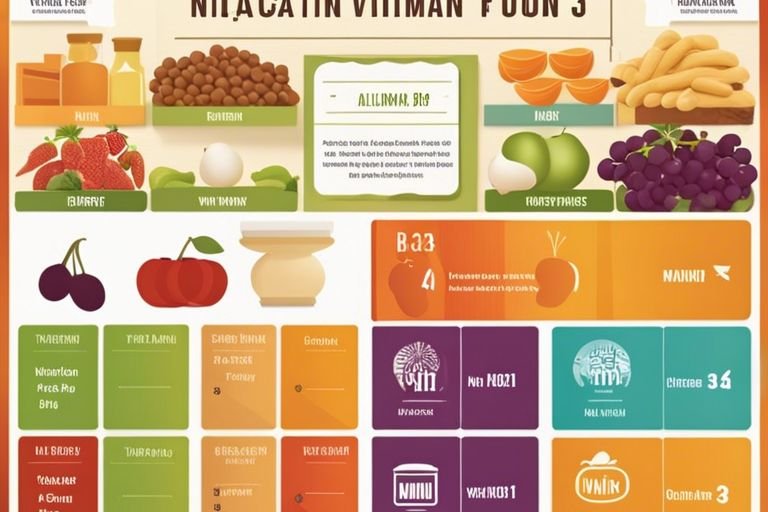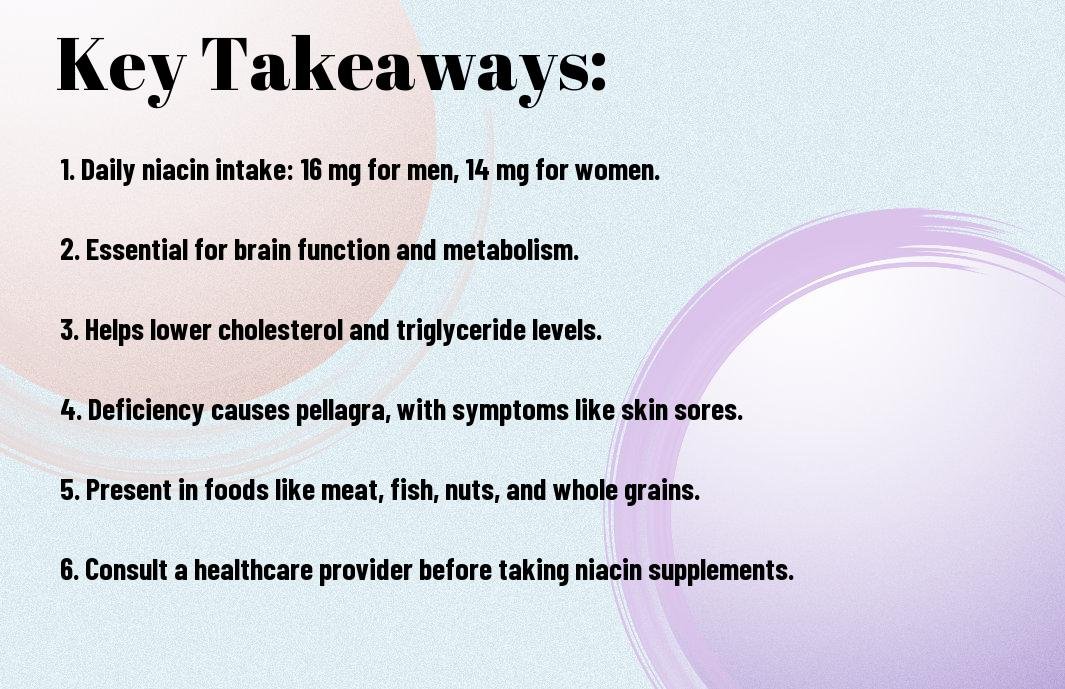
Vitamin B3, commonly known as niacin, plays a crucial role in supporting a healthy metabolism and cardiovascular system. Ever wondered how much niacin you should be getting each day to reap its benefits? In this informative blog post, we will research into the daily allowance of niacin, its sources, and why it is crucial for overall well-being. Let’s uncover the science behind this vital nutrient and how it can impact your health.
Key Takeaways:
- Niacin Daily Allowance: The recommended daily allowance of niacin, also known as Vitamin B3, is 16 mg for adult males and 14 mg for adult females. This important nutrient plays a crucial role in metabolism and overall health.
- Sources of Niacin: Niacin can be found in various foods such as poultry, fish, nuts, and seeds. It can also be obtained through supplements, but it’s always best to consult with a healthcare provider before adding them to your routine.
- Health Benefits: Adequate niacin intake can help support a healthy cardiovascular system, promote proper brain function, and aid in energy production. Ensuring you meet the daily allowance of niacin is important for overall well-being.

Importance of Niacin (Vitamin B3)
While niacin, also known as Vitamin B3, is often recognized for its role as an crucial nutrient, its importance goes beyond mere recognition. Niacin plays a crucial role in numerous bodily functions, making it a vital component of a healthy diet.
Role in Energy Metabolism
Metabolism is the process through which our bodies convert food into energy. Niacin plays a significant role in this process by helping to convert carbohydrates, fats, and proteins into usable energy. Without an adequate amount of niacin, our bodies may struggle to efficiently produce energy, leading to fatigue and other health issues.
Brain Function and Health
Niacin is not only crucial for energy production but also plays a crucial role in maintaining brain function and overall cognitive health. Adequate levels of niacin are necessary for proper brain development and function, as well as for the synthesis of various neurotransmitters that are crucial for communication within the brain.
With its ability to support cognitive function, niacin has been linked to improved memory, focus, and overall brain health. Research has also suggested that niacin may play a role in reducing the risk of neurodegenerative diseases such as Alzheimer’s.
Recommended Daily Allowance
If you’re wondering about the daily allowance of niacin (Vitamin B3), understanding the recommended intake is crucial for maintaining optimal health.
General Guidelines
Recommended: For adults, the Recommended Dietary Allowance (RDA) for niacin is 16 milligrams per day for men and 14 milligrams per day for women. Pregnant women may require slightly more at 18 milligrams per day, while lactating women should aim for 17 milligrams per day.
Age-Specific Requirements
Recommended: Infants up to 6 months old require 2 milligrams of niacin per day, while those between 7-12 months need 4 milligrams. Children between 1-3 years old should consume 6 milligrams daily, and this increases gradually as they grow older.
This gradual increase in niacin requirements continues throughout childhood and adolescence, with teenage boys requiring 16 milligrams per day and girls needing 14 milligrams daily.
Factors Affecting Niacin Needs
- One: Genetics can play a role in the efficiency of niacin absorption and utilization in the body.
- Knowing: Dietary factors, such as protein intake and overall diet quality, can also impact niacin requirements.
The presence of certain medical conditions or medications may affect how niacin is processed in the body, influencing individual needs for this crucial vitamin.
Food Sources of Niacin
Animal-Based Foods
Sources of niacin in animal-based foods include poultry, beef, pork, and fish. These protein-rich options not only provide a good amount of niacin but also offer imperative amino acids for overall health. For example, a 3-ounce serving of cooked chicken breast contains about 8.9 mg of niacin, which is nearly half of the daily recommended intake for adults.
Plant-Based Foods
Food sources of niacin in plant-based options include mushrooms, avocados, whole grains, and legumes. While plant-based foods may not have as high of niacin content as animal-based sources, they provide valuable nutrients like fiber, vitamins, and minerals. For instance, one cup of cooked crimini mushrooms contains approximately 3.6 mg of niacin.
With a well-rounded diet that includes a variety of plant-based foods, you can easily meet your daily niacin requirements while reaping the benefits of a diverse nutrient profile.
Fortified Products
To boost niacin intake, fortified products like cereals, bread, and nutritional yeast are excellent options. Many food manufacturers add niacin to these products to enhance their nutritional value. A bowl of fortified breakfast cereal can provide up to 20 mg of niacin, making it a convenient way to meet your daily requirements.
Foods enriched with niacin are especially beneficial for individuals who may have dietary restrictions or limited access to natural food sources of this imperative vitamin.
Niacin Deficiency and Risks
Once again, it is vital to emphasize the importance of maintaining adequate levels of niacin in the body to prevent deficiency and associated health risks. Niacin deficiency can lead to various health issues due to the critical role this vitamin plays in numerous bodily functions.
Symptoms of Deficiency
The symptoms of niacin deficiency can manifest in several ways, including fatigue, digestive issues, skin problems, and even neurological problems. Severe deficiency can result in a condition known as pellagra, characterized by the “4 Ds” – dermatitis, diarrhea, dementia, and death if left untreated.
Health Risks Associated with Deficiency
To further complicate matters, niacin deficiency can increase the risk of cardiovascular diseases, as this vitamin helps regulate cholesterol levels and maintain the health of the cardiovascular system. Additionally, inadequate niacin levels can impact the proper functioning of the nervous system, leading to a range of neurological symptoms.
Deficiency in niacin can have serious consequences for overall health and well-being. Ensuring an adequate intake of this vital vitamin is crucial in preventing these health risks and maintaining optimal bodily functions.
Populations at Risk
Risks of niacin deficiency are higher in certain populations, including individuals with poor dietary habits, chronic alcoholics, individuals with certain medical conditions affecting nutrient absorption, and people living in poverty or food insecurity. It is crucial for these at-risk groups to be especially mindful of their niacin intake and consider supplementation if needed to prevent deficiency-related health issues.
Niacin plays a vital role in maintaining overall health and well-being, and understanding the risks associated with deficiency can help individuals take proactive steps to ensure they are meeting their daily niacin requirements through diet or supplementation.
Niacin Toxicity and Overdose
Symptoms of Overdose
To understand niacin overdose, it’s crucial to recognize the symptoms associated with consuming too much of this vitamin. Symptoms of niacin overdose can include flushing of the skin, itching, nausea, vomiting, diarrhea, abdominal pain, and liver toxicity. In severe cases, overdose can lead to liver failure and even death.
Health Risks Associated with Overdose
Toxicity from niacin overdose can have serious health implications. High doses of niacin can cause an increase in blood sugar levels, leading to potential complications for individuals with diabetes. Additionally, excessive niacin consumption can result in liver damage and dysfunction, putting further strain on this vital organ.
Niacin overdose can also lead to an imbalance in other nutrients in the body, such as B vitamins. This disruption can have wide-ranging effects on various bodily functions and may worsen existing health conditions.
Treatment and Prevention
Overdose of niacin requires immediate medical attention. Treatment for niacin overdose typically involves stopping the intake of niacin supplements and addressing symptoms as they arise. In severe cases, medical interventions may be necessary to manage complications such as liver damage.
Avoiding niacin overdose is crucial for maintaining optimal health. It is crucial to follow recommended daily allowances and consult a healthcare provider before starting any new vitamin regimen. Moderation is key in ensuring the benefits of niacin supplementation without risking overdose.
Interactions and Contraindications
Despite being a beneficial nutrient, niacin can interact with certain medications, foods, and health conditions, leading to potential contraindications. It is necessary to be aware of these interactions to avoid any adverse effects on your health.
Medication Interactions
To avoid any potential interactions, it is crucial to consult with your healthcare provider before taking niacin supplements, especially if you are on medications such as cholesterol-lowering drugs, blood thinners, or diabetes medications. Niacin may enhance the effects of these drugs or lead to unwanted side effects when taken together.
Food and Nutrient Interactions
Contraindications for niacin also extend to certain foods and nutrients. Alcohol consumption while taking niacin supplements may increase the risk of liver damage. It is advisable to limit alcohol intake or consult with a healthcare provider before combining alcohol and niacin. Additionally, large doses of niacin may interfere with the absorption of certain minerals such as zinc, leading to potential nutrient deficiencies.
Health Conditions and Contraindications
With certain health conditions, caution should be exercised when taking niacin supplements. Individuals with liver disease, kidney problems, or a history of gout should consult with a healthcare provider before using niacin, as it may worsen these conditions. Pregnant or breastfeeding women should also seek medical advice before taking niacin supplements to ensure the safety of both mother and baby.
Interactions with medications, foods, and health conditions can impact the efficacy and safety of niacin supplements. It is necessary to communicate openly with your healthcare provider about any existing conditions or medications to prevent any potential contraindications.
Summing up
Upon reflecting on the daily allowance of niacin (Vitamin B3), it is crucial to understand the significance of this necessary nutrient in maintaining overall health. Niacin plays a key role in converting food into energy, maintaining healthy skin, and supporting proper nerve function. By ensuring that we meet the recommended daily intake of niacin, we can support our body’s vital functions and promote overall well-being.
FAQ
Q: What is the daily allowance of Niacin (Vitamin B3)?
A: The daily allowance of Niacin, also known as Vitamin B3, can vary depending on age, gender, and specific health conditions. However, in general, the recommended daily allowance for adults is around 14-16 milligrams for women and 16-18 milligrams for men.
Q: Why is Niacin (Vitamin B3) important for our health?
A: Niacin plays a crucial role in various bodily functions, including metabolism, energy production, and maintaining healthy skin, nerves, and digestion. It also helps lower cholesterol levels and supports cardiovascular health.
Q: What are the food sources of Niacin (Vitamin B3)?
A: Niacin can be found in a variety of foods, including meat (such as chicken, turkey, and beef), fish (such as salmon and tuna), nuts and seeds, legumes, whole grains, and fortified cereals. Incorporating these foods into your diet can help meet your daily Niacin requirements.
